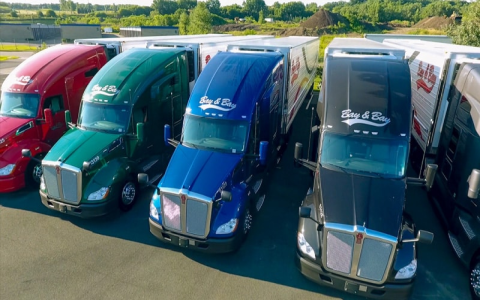Lease Purchase Trucking Companies in Alabama | Your Guide
Lease Purchase Trucking Companies in Alabama | Your Guide
If you’re a truck driver in Alabama with the dream of being your own boss but aren’t ready for the massive upfront cost of buying a rig outright, a lease purchase program might be your perfect path. This guide cuts through the noise to give you a clear, honest look at how lease purchase trucking companies in Alabama work. We’ll break down the pros and cons, compare top providers, and give you the real-world advice you need to make an informed decision. Think of this as your roadmap to understanding if this popular trucking path is the right fit for your career and financial goals.
What is a Lease Purchase Program, Really?
At its core, a lease purchase agreement is a long-term rental with an option to buy. You, the driver, lease a truck from a carrier for a set period—often two to four years. Each week, a payment is automatically deducted from your settlement for the truck. Once you’ve made all the payments or reached a final “buyout” amount, the truck is yours. Many companies also include a maintenance escrow account, where a small portion of your pay is set aside to cover future repairs, helping you avoid large, unexpected bills. It’s a structured way to eventually own your truck without the daunting initial loan.

The Alabama Advantage for Truckers
Why consider an Alabama-based carrier? The state offers specific benefits that can make a lease purchase deal more attractive. For starters, Alabama is a major logistics hub, home to the Port of Mobile and crisscrossed by critical interstates like I-20, I-65, and I-85. This means consistent freight lanes and less deadhead mileage. Furthermore, the cost of living in Alabama is below the national average, which is a big plus when you’re building your business and every dollar counts. According to the Bureau of Transportation Statistics, the Gulf Coast region, which includes Alabama, consistently shows strong freight volumes, providing a stable environment for owner-operators.
Weighing the Pros and Cons
Before you sign anything, it’s crucial to understand the full picture. Here’s a balanced view from a driver’s perspective.
The Upsides
- Low Startup Cost: You can get behind the wheel of a late-model truck for little or no money down.
- Path to Ownership: Every payment builds your equity, moving you closer to owning your asset.
- Business Support: The company handles dispatch, finds freight, and often provides fuel discounts and licensing support.
- Tax Benefits: As you are essentially running your own business, you may be able to deduct certain business expenses.
The Downsides
- Financial Risk: If freight is slow, you still owe the weekly truck payment, which can create financial pressure.
- Total Cost: By the end of the lease, you may end up paying more for the truck than if you had financed it traditionally.
- Contract Complexity: The terms can be tricky. It’s vital to understand what happens if you want to exit the lease early or if the truck has a major mechanical failure.
Comparing Top Alabama Lease Purchase Companies
Not all programs are created equal. Here’s a comparison of some key players to help you start your research.
| Company | Program Length | Average Weekly Payment | Key Feature |
|---|---|---|---|
| Company A | 2-3 Years | $600 – $800 | No money down, comprehensive maintenance plan |
| Company B | 3-4 Years | $500 – $700 | High percentage of drop & hook freight |
| Company C | 2 Years | $700 – $900 | Direct freight contracts with major shippers |
Expert Advice: The Questions You Must Ask
Before committing, do your homework. John Davis, a transportation consultant with over 20 years of experience, emphasizes due diligence. “A reputable truck lease purchase program is transparent. Don’t just look at the glossy brochure; dig into the details,” he advises.
- What is the total buyout amount? Know the exact dollar figure you will pay to own the truck at the end.
- How is freight assigned? Ask about the company’s freight mix and how they ensure consistent miles for their lease operators.
- What are the program’s hidden fees? Inquire about administrative fees, forced escrow accounts, and any other potential deductions.
- Can I speak to current drivers in the program? A good company will let you talk to their operators to get unfiltered feedback.
Is a Truck Lease Purchase in Alabama Right for You?
This model is best suited for a specific type of driver. You need to be highly motivated, financially disciplined, and have a solid safety record. It’s a business venture, not just a driving job. The Federal Motor Carrier Safety Administration (FMCSA) data shows that successful owner-operators are those who meticulously manage their expenses. If you’re willing to put in the work to understand the business side of trucking and can handle the variable income, an Alabama truck lease purchase can be a powerful vehicle for achieving independence.
Frequently Asked Questions
What credit score is needed for a lease purchase?
Most companies are more interested in your driving record and work history than a perfect credit score. While requirements vary, many programs are accessible to drivers with fair credit, as the truck itself serves as collateral.
Can I walk away from a lease purchase agreement?
This is one of the most critical parts of your contract. Some agreements are “lease-to-own,” meaning you are obligated to buy the truck. Others are a “lease-purchase,” which may give you an option to walk away, often with a penalty. You must read and understand the termination clause before signing.

Who pays for repairs during the lease?
This varies by company. Many have a maintenance escrow account that you fund, which is then used for repairs. Others might handle certain repairs directly. Clarify what is covered, what your deductible is, and who authorizes the work.
How much can I realistically earn?
Earnings are highly variable. After your truck payment, fuel, insurance, and taxes, a diligent driver with a good lease purchase trucking company can have a take-home pay that exceeds company driver pay. However, it requires smart business management. The American Trucking Associations (ATA) reports that owner-operator income can fluctuate significantly with market conditions.
Sources:
U.S. Bureau of Transportation Statistics (BTS)
Federal Motor Carrier Safety Administration (FMCSA)
American Trucking Associations (ATA)









